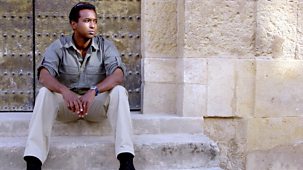
Episode 02 October 2018
At the British Museum, a collection of artefacts from the Muslim world is on show, which tells the history of a journey to Mecca always forbidden to non-Muslims. It features a succession of examples of the rich visual language of Islamic culture past and present, artwork created to reflect the powerful experience for any Muslim making the Hajj pilgrimage to Islam's most sacred city and its most sacred building, the Ka'aba. However, an art form not usually associated with Islam is also on show, a form many believe is prohibited by Islam - portraits, depictions of human figures and whole tableaux showing pilgrims performing the most important pillar of the Muslim faith. \n\nIn this documentary, Rageh Omaar sets out to find out that if human depiction is the source of such controversy, how is it that the art displayed here shows a tradition of figurative art at the heart of Islam for century after century? He explores what forms of art are acceptable for a Muslim - and why this artistic tradition has thrived - in the hidden art of the Muslim world.
Source: BBC 4
Most recent episodes of The Hidden Art of Islam
The Hidden Art Of Islam
Episode 02-10-2018
At the British Museum, a collection of artefacts from the Muslim world is on show, which tells the history of a journey to Mecca always forbidden to non-Muslims. It features a s ...
02-10-2018
BBC 4
Most popular episodes of The Hidden Art of Islam
The Hidden Art Of Islam
Episode 02-10-2018
At the British Museum, a collection of artefacts from the Muslim world is on show, which tells the history of a journey to Mecca always forbidden to non-Muslims. It features a s ...
02-10-2018
BBC 4

